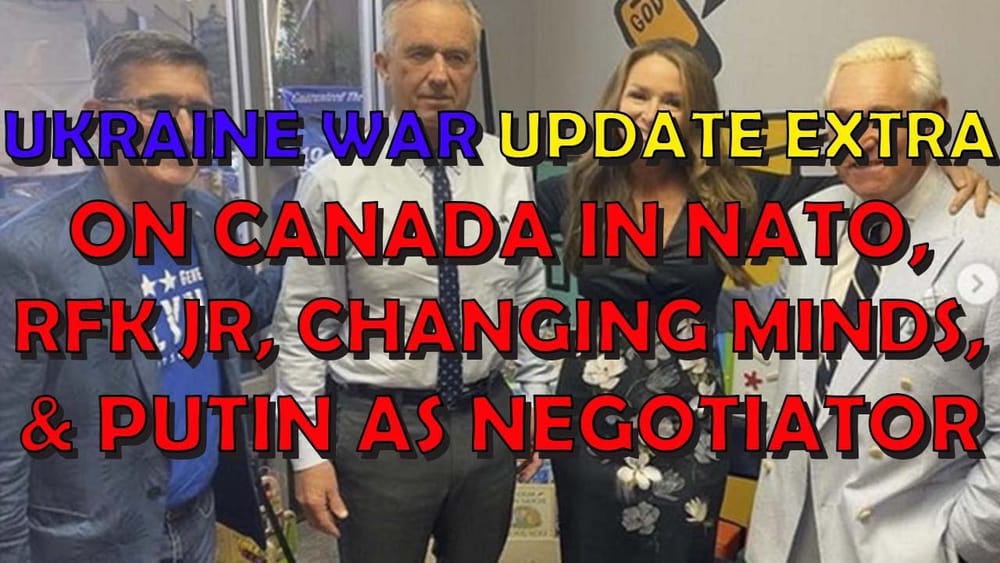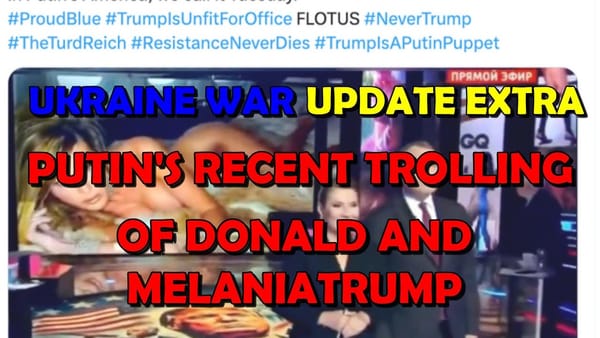Ukraine War Upd. EXTRA: Canada in NATO, RFK Jr, Putin as Negotiator, & Changing Minds
Table of Contents 📖
"Putin knew how to give orders, but he didn't know how to negotiate... Instead, he used only blackmail and various instruments of war to negotiate."
Hello Team
🎦 00:00-00:11⏩
Jonathan introduces the video as an "Extra" which will discuss interesting points from a book by Owen Matthews called "Overreach" as well as viewer comments.
Return to top⤴️
Putin as Negotiator
🎦 00:11-10:23⏩
Jonathan discusses an excerpt from Owen Matthews' book Overreach: The Inside Story of Putin's War Against Ukraine. The excerpt focuses on a meeting between Putin and Zelensky in Paris in 2019. Jonathan highlights Putin's tendency to arrive late for meetings as a power play to demonstrate he's in control. Jonathan observes that the excerpt’s author (Matthews) characterizes Putin as a weak negotiator, someone who, accustomed to dictating terms in Russia, resorts to “blackmail and various instruments of war to negotiate.” Jonathan uses this observation as a lens to examine Putin's negotiating style, contrasting the Russian president’s approach to that of British Prime Minister Rishi Sunak who, according to Jonathan, faces accountability and scrutiny from Parliament, the media and the public. Jonathan argues that the lack of similar accountability for Putin distorts his understanding of the world and limits his ability to negotiate in good faith.
Return to top⤴️
Canada's Contribution to NATO
🎦 10:23-23:25⏩
Jonathan reads and responds to a long comment from viewer Karen Spenook regarding Canada’s contributions to NATO. Spenook criticizes what she perceives as a “Eurocentric” view of Canada’s role in the alliance, arguing that Canada has historically prioritized peacekeeping over military spending. Spenook points to Canada’s participation in World War I and II, highlighting the contributions and sacrifices made by Canadians in defence of European allies. She underscores Canada’s long-standing military presence in Europe, dating back to 1951, and its financial support for NATO allies, specifically referencing a $2.6 billion project to upgrade Canadian military bases in Latvia. She expresses frustration that despite Canada’s contributions, the country is often perceived as a “freeloader,” particularly given its geographic distance from Europe. Jonathan acknowledges the points raised by Spenook, admitting that he hadn’t fully considered the logistical challenges faced by Canada or the country’s history as a peacekeeping nation. He concedes that measuring contributions to NATO solely based on GDP percentage might not accurately reflect Canada’s commitment to the alliance.
Return to top⤴️
Canadian Volunteer Paul Hughes
🎦 23:25-23:30⏩
Jonathan briefly acknowledges a comment by viewer Anton Garaschchenko.
Return to top⤴️
Canadian Volunteer Paul Hughes - Humanitarian Aid in Kharkiv
🎦 23:30-23:37⏩
Jonathan shares a news item about a Canadian volunteer, Paul Hughes, who moved to Ukraine at the start of the invasion and opened a workshop in Kharkiv to repair military and volunteer vehicles. Hughes also created a humanitarian organization called “HUGS” to provide food, clothing and medicine to residents near the frontlines. Jonathan highlights that Hughes has no Ukrainian heritage but was motivated by the strong Ukrainian community in Canada. Hughes’ story segues into a discussion of another viewer comment.
Return to top⤴️
Robert Kennedy Jr - Vatnik Soup Thread
🎦 23:37-34:32⏩
Jonathan delves into a “Vatnik Soup” thread from Twitter account Kelly and Yami’s, dissecting Robert Kennedy Jr.’s political positions and his stance on the war in Ukraine. Jonathan characterizes Kennedy, who is running for president as a Democrat, as a purveyor of conspiracy theories, citing Kennedy’s anti-vaccine activism, his promotion of misinformation about COVID-19 and his affiliations with far-right political figures such as Steve Bannon and Roger Stone. Jonathan reads a series of tweets by Kelly and Yami that outline Kennedy’s political background, highlighting his family’s political legacy, his early legal career and his pivot to environmental activism and then to anti-vaccine advocacy. Jonathan expresses concern about Kennedy’s embrace of conspiracy theories, especially his unfounded claims linking vaccines to autism and cancer, and his downplaying of the COVID-19 pandemic. Jonathan argues that Kennedy has adopted a pro-Kremlin stance, uncritically repeating Russian disinformation about the war in Ukraine. He cites examples of Kennedy falsely accusing Ukraine of committing genocide in Donbas, misrepresenting casualty figures and perpetuating the myth that NATO promised not to expand eastward. Jonathan concludes that Kennedy’s presidential campaign poses a threat to the Democratic Party, alleging that far-right figures like Bannon are using Kennedy as a “chaos agent” to undermine Joe Biden’s re-election bid.
Return to top⤴️
Countering Disinformation with Humour
🎦 34:32-37:45⏩
Jonathan segues from the previous topic to discuss an article from “Euromide Impress” that advocates using humour to counter Russian disinformation. Jonathan highlights a quote from the article in which Ukrainian activist Anniette Kopieria argues that simply debunking disinformation is not an effective strategy, asserting that ridicule can be more impactful, especially given that Russian disinformation agents are often more interested in sowing discord than in engaging in genuine debate. Jonathan observes that countering disinformation is a time-consuming process and that Russian trolls, much like Jehovah’s Witnesses, are not interested in good-faith dialogue or having their views challenged. Jonathan recounts an anecdote in which he engaged in a lengthy conversation with Jehovah’s Witnesses at his door, a conversation that ultimately proved fruitless. Jonathan argues that while engaging in reasoned debate might not sway the minds of committed trolls, it can be beneficial for third parties who are open to rational arguments and evidence. He concludes by suggesting that humour, particularly in the form of memes, can be a powerful tool to undermine disinformation, citing viewer John Larkin’s success in using humour to engage with and defuse trolls.
Return to top⤴️
Disagreeing with Americans - Cultural Differences
🎦 37:45-53:05⏩
Jonathan addresses a comment from British viewer, Tom Thurnby, who expresses frustration about trying to engage with Americans who hold misinformed views about Ukraine. Thurnby observes that Americans prioritize politeness over directly confronting falsehoods, whereas Europeans tend to be more direct in calling out lies. Jonathan challenges Thurnby’s characterization of this as a cultural difference, suggesting that the internet age has fostered a more confrontational style of online discourse that transcends national boundaries. Jonathan argues that online anonymity emboldens people to behave more aggressively than they would in face-to-face interactions and that this lack of accountability contributes to the proliferation of misinformation. Jonathan discusses the challenges of changing people’s minds, emphasizing that people are more likely to be persuaded by individuals within their “in-group.” He recounts an anecdote in which his friend, a conservative Christian who rejected evolution, was ultimately swayed not by Jonathan’s arguments, but by those of a Cambridge professor who was also a Christian. Jonathan extrapolates from this anecdote to suggest that changing minds is often about finding the right messenger rather than simply presenting the right arguments. He emphasizes the importance of “epistemic humility,” the willingness to acknowledge the limitations of one’s own knowledge, and the importance of engaging in “good faith dialogue.” Jonathan concludes by suggesting that using humour to mock or belittle someone is not an effective way to change their mind, arguing instead for a more empathetic approach that prioritizes understanding and seeks to find common ground. He acknowledges that changing deeply held beliefs is a gradual process that requires patience, empathy and a willingness to connect with individuals on a personal level.
Return to top⤴️
Wrap up
🎦 53:05-53:32⏩
Jonathan concludes the video, acknowledging that it has been a long one.
Return to top⤴️



